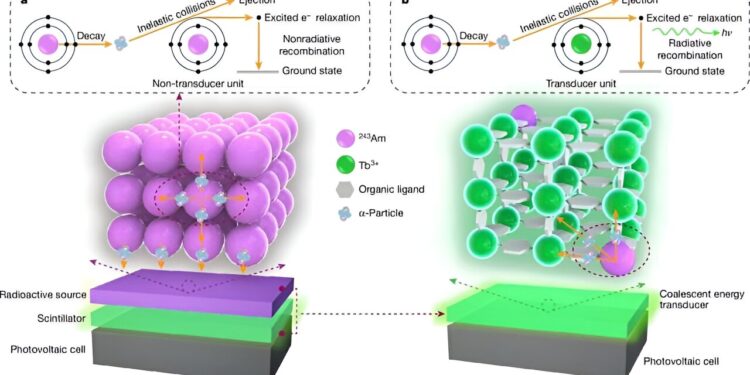Two different architectures of radiophotovoltaic batteries. Credit: Nature (2024). DOI: 10.1038/s41586-024-07933-9
It’s been a good week for space science, as a trio of geologists from Monash University discovered evidence that Earth may have had a ring system 466 million years ago. Studying plate tectonics during the Ordovician period, Andrew Tomkins, Erin Martin and Peter Cawood found that the positions of 21 asteroid impacts were within 30 degrees of the equator. And a team of astronomers from the California Institute of Technology discovered the largest black hole jets ever observed, shooting hot plasma far beyond their own host galaxy.
In new technologies, a team of materials scientists at Princeton University has developed a stronger type of concrete inspired by bone structure. A team of engineers at Tokyo Metropolitan University has revealed a new electrochemical cell designed to turn carbon dioxide into green fuel. Meanwhile, a team of physicists and engineers affiliated with several institutions in China has developed an extremely small nuclear battery that is up to 8,000 times more efficient than its predecessors. And a team of robotics engineers at Zhejiang University in China has demonstrated a magnetically driven soft robot that can jump at high speeds: The magnetically driven robots were able to jump more than 108 body lengths, with a takeoff speed of 2 meters per second.
Separately, an international team of psychologists has found that people tend to underestimate the incomes of the top 1 percent, perhaps due to what they describe as “scope insensitivity.” A team of engineers and medical researchers from the University of Hong Kong has developed a next-generation wearable continuous glucose monitoring system for diabetes management that they say represents a major advance in wearable health technology. Meanwhile, a team of engineers and biologists from Kyushu University in Japan and Chulalongkorn University in Thailand has discovered a possible explanation for the “missing plastic problem”: coral skeletons. Finally, a team of engineers from Oregon Health & Science University, working with a team from Tualatin Valley Fire and Rescue and Washington County Public Health, has developed a new approach to defibrillation that could soon improve outcomes in cardiac arrests.
© 2024 Science X Network
Quote: Best of Last Week — Earth Could Have Had Rings, Improved Nuclear Battery, New Approach to Defibrillation (2024, September 23) retrieved September 23, 2024 from
This document is subject to copyright. Apart from any fair dealing for the purpose of private study or research, no part may be reproduced without written permission. The content is provided for informational purposes only.



